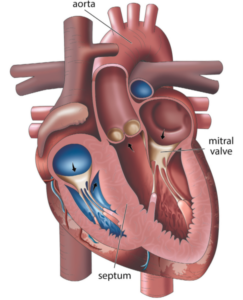Hypertrophic Cardiomyopathy (HCM)
Hypertrophic Cardiomyopathy (HCM) is a heart muscle disease that makes the heart grow too thick. It affects at least 1 in 500 people in the population. This means there are over 750,000 people in the United States with this disorder. HCM can be inherited from family members. Some people who are born with this condition may not develop symptoms until much later in life.
Symptoms
Hypertrophy Cardiomyopathy causes symptoms by preventing blood from going from the heart to the rest of the body. When this happens, the disease is called Hypertrophic Obstructive Cardiomyopathy (HOCM). The most common symptom of HOCM is the feeling of shortness of breath with activity or even after eating. Some patients may develop abnormal heart rhythms or heart failure. HOCM can also cause patients to die suddenly. Many patients with HCM feel well and do not have symptoms. Other patients may develop symptoms later in life.
Causes & Genetics
HCM is caused by abnormal genes. Parents who have this condition can pass it on to their children. Many different types of genes can cause HCM. Patients with HCM can see a genetic counselor to help better understand their genetic history.
Testing
HCM is most commonly diagnosed by taking pictures of the heart. A heart ultrasound (echocardiogram) or MRI will see if the heart muscle is thick and if there is a blockage to blood flow within the chambers of the heart. Gene testing is also used for patients who have family members with HCM to see if they have a potential to develop the disease.
Treatment
Medical Management – Medications are used to help make it easier for blood to leave the heart and go to the rest of the body. The most common medications work by slowing the heart rate. Other medications can be used to help treat abnormal heart rhythms.
Septal Myectomy – This is surgery to reduce the size of the muscle that has thickened. The muscle does not regrow. Symptoms are ameliorated and often patients say they did not realize how bad their symptoms were until they have recovered from the operation and realize how much better their quality of life is. Septal myectomy prolongs the survival of the patient HOCM. It may also reduce the occurrence of arrhythmias.
Septal Ablation – Alcohol septal ablation is a non-surgical, catheter-based treatment that reduces myocardial septal thickness and helps relieve obstruction in people with HOCM. The procedure uses alcohol to shrink the heart muscle in the area that causes the obstruction of blood flow out of the heart. This procedure provides an option to reduce the heart muscle thickness in people who are considered to be too high risk for septal myectomy.
Defibrillator – In patient who have massive muscle thickness or occurrence of certain heart rhythm changes, a cardioverter-defibrillator is implanted to help prevent sudden death. Not all patients require this therapy, but everyone with HOCM should be evaluated for the potential need.


